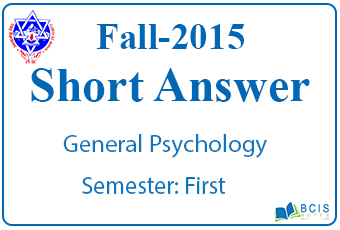
Very Short Question Fall 2015
The answers to the Very Short Question Fall 2015 are given below:
1. Introduce the major sub-fields of psychology.
ANS- Psychology is a multifaceted discipline and includes many sub-fields of study such areas as:
- human development
- sports
- health
- clinical
2. What is the difference between the sympathetic and parasympathetic nervous system?
ANS-
| BASIS OF COMPARISON | PARASYMPATHETIC NERVOUS SYSTEM | SYMPATHETIC NERVOUS SYSTEM |
| Point Of Origin | Originates from the cranial and sacral regions of the central nervous system. | Originates from cranial, thoracic and lumbar regions of the central nervous system. |
| Role | Relaxes the body and inhibits high energy functions. | Prepares the body for intense physical activity. |
3. Mention the difference between compliance and conformity.
ANS- The fundamental difference between conformity and compliance is that compliance involves people going along with an explicit request, whereas conformity involves people adhering to ‘unspoken rules’. We comply with people’s requests because we like to be seen as helpful.
4. Define Sensory Threshold.
ANS- In psychophysics, the sensory threshold is the weakest stimulus that an organism can detect. Unless otherwise indicated, it is usually defined as the weakest stimulus that can be detected half the time, for example, as indicated by a point on a probability curve. Methods have been developed to measure thresholds in any of the senses.
5. What is retroactive interference?
ANS- Retroactive interference occurs when new information interferes with your ability to recall old information. Things that are more recent and fresh are easy to remember, but old information feels far away, even if you spent more time learning it.
6. Write the component (tools) of thinking.
ANS- The components of thinking are:
- Images
- Concepts
- Symbols
- Language
- Brain
7. What is IQ?
ANS- .Q. (intelligence quotient) in general, is an assessment of your ability to think and reason. IQ score is a standardized way of comparing this ability with the majority of people the same age as you are.
8. Define Psychoneuroimmunology of stress.
ANS- Psychoneuroimmunology is defined as the examination of the interactions among psychological, behavioral, and social factors with immunological and neuroendocrine outcomes. It is now well established that psychological factors, especially chronic stress, can lead to impairments in immune system functioning in both the young and older adults.
9. Discuss briefly emotion and types of emotion.
ANS- Emotion is a complex psychophysiological experience that we experience as a result of our interactions with our environment. The types of emotion are:
- Happiness
- Anger
- Fear
- Surprise
10. How the Freud defines the Oedipus complex and Electra complex.
ANS- Oedipus complex is a term Sigmund Freud used in his psychoanalytic theory of sexual drive. This term refers to a child’s sexual desire for the parent of the opposite sex and a sense of rivalry with the parent of the same sex. Electra complex is the female equivalent of the Oedipus complex.
You may also like Pokhara University || Fall,2015 || General Psychology

Leave a Reply